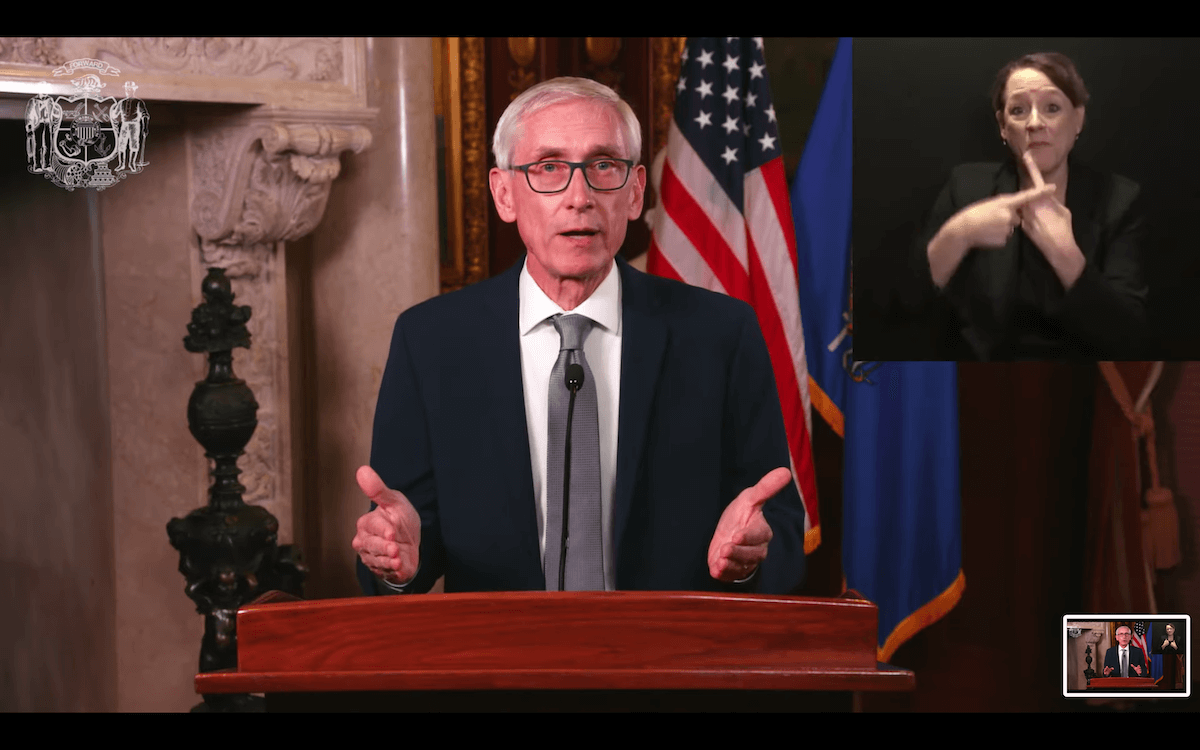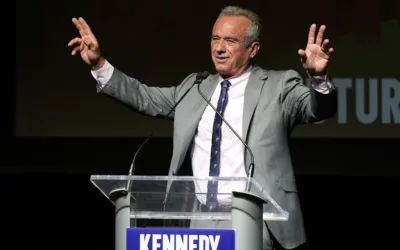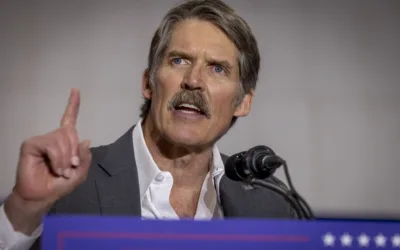
#image_title
If nothing changes, Institute for Health Metrics and Evaluation estimates another 2,500 Wisconsinites could die by Jan. 1.
On the same day Wisconsin saw more than 7,000 new coronavirus cases and 66 more deaths, Gov. Tony Evers passed an executive order advising, rather than legally requiring, Wisconsin residents stay at home and encouraging businesses to protect their workers and communities.
“Wisconsin, this is serious,” Evers said. “This crisis is urgent.”
Evers made it clear that the successful legal challenge to his previous effort to issue a safer-at-home order directly played into his decision to make this order advisory in nature.
Evers reminded the public that when the safer-at-home order was issued in March it was projected that the order would save 300 to 1,400 lives. The State Supreme Court struck that order down in May. Evers said that decision “hamstrung our ability to respond to this virus by using tools supported by science and public health experts.”
“Unfortunately, since then, Wisconsin has become a national hotspot,” Evers said.
Evers also announced that his administration plans to introduce a package of COVID-19 legislation that, “should be passed quickly to make sure we have the resources ready for those who need it.”
As of Tuesday, 2,395 Wisconsinites have died from COVID-19.
Since just last Friday, 25,000 Wisconsin residents have tested positive for COVID-19. Evers said it took just over seven months to get to 100,000 cases, but then a mere 36 days to add another 100,000.
“The way things are going, it will take us only 20 days to reach another 100,000,” Evers said.
The Institute for Health Metrics and Evaluation predicts that without any changes to current trends, the number of deaths could reach 5,000 by Jan. 1.
Throughout the pandemic, Evers has made attempts to effect change and curb the spread of the virus through mandates and orders. However, the GOP-controlled Legislature and conservative-leaning legal firms have shown they are not in favor of those efforts.
Assembly Speaker Robin Vos, R-Rochester, told the Milwaukee Journal Sentinel that he and Evers have not spoken since May, though their staffs have talked.
“Gov. Evers has consistently said he will not even talk to us until we have our own plan, which I think is idiotic,” Vos said. “As I’ve said how many times, you have to have the ability to sit down and talk about things that you think are important. … It’s one common goal, which is to help people make sure they can get through the virus.”
However, after Evers’ speech, Vos told reporters he called the governor. He did not reach him.
“I think the people of Wisconsin want us to stop arguing about COVID and start working together to show that we can actually help to work together to solve the problem,” said Vos, according to the Milwaukee Journal Sentinel.
The governor also warned that federal Coronavirus Aid, Relief, and Economic Security funds are set to expire on Dec. 31. Evers said those funds have provided 16 million items of personal protective equipment to communities across the state, assistance to 26,000 small businesses and 15,000 farms, rental support for 12,000 households, and allowed the state to expand contact tracing efforts.
“That means unless we get additional support from Congress, our state will have to foot the bill for our response after the New Year,” Evers said. “So, please contact your congressperson and ask them to provide additional support and resources for our state’s response to this virus. We must be able to continue all our efforts to keep people healthy and safe.”
In addition to individuals who have contracted the virus–particularly those who have been or are hospitalized or have died–Evers asked Wisconsinites to think about healthcare workers and the toll the virus is taking on them.
“Our healthcare workers are going to work every day, working three, sometimes four, shifts in a row, often having to reuse or share masks, and putting themselves and their families at risk to do their jobs,” Evers said. “We owe them our thanks, but they also deserve our action.”
Hospital administrators throughout the state report between 5% and 15% of their staff have been quarantined in recent weeks at the same time as patient load is growing significantly. A lack of available staff to treat more patients is stretching existing staff, hospital administrators said.
Officials at hospitals throughout Wisconsin said they are experiencing staffing shortages amid repeated COVID-19 outbreaks. Available beds to treat patients infected with the virus also are in short supply, they said.
Evers also said that any economic recovery is impossible as the virus continues to spread.
“Our bars, restaurants, small businesses, families, and farmers will continue to suffer if we don’t take action right now—our economy cannot bounce back until we contain this virus,” Evers said. “I am concerned about what our current trajectory means for Wisconsin healthcare workers, families, and our economy if we don’t get this virus under control.”
Evers said he is optimistic the state can contain the virus and called for unity in those efforts.
“The surges we see—the new cases, hospitalizations, and deaths—these are not foregone conclusions. These are predictable and preventable,” Evers said. “That means the fight against this virus is winnable, but only if we fight it together.”

New Biden rules deliver automatic cash refunds for canceled flights, ban surprise fees
In the aftermath of a canceled or delayed flight, there’s nothing less appealing than spending hours on the phone waiting to speak with an airline...

One year on the Wienermobile: The life of a Wisconsin hotdogger
20,000+ miles. 16 states. 40+ cities. 12 months. Hotdogger Samantha Benish has been hard at work since graduating from the University of...

Biden makes 4 million more workers eligible for overtime pay
The Biden administration announced a new rule Tuesday to expand overtime pay for around 4 million lower-paid salaried employees nationwide. The...

‘Radical’ Republican proposals threaten bipartisan farm bill, USDA Secretary says
In an appearance before the North American Agricultural Journalists last week, United States Department of Agriculture (USDA) Secretary Tom Vilsack...




